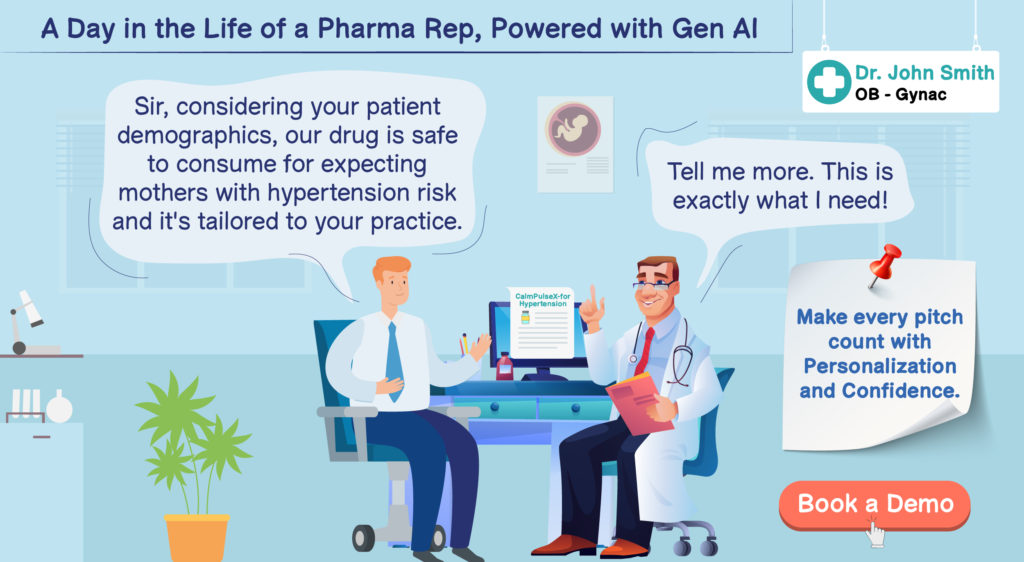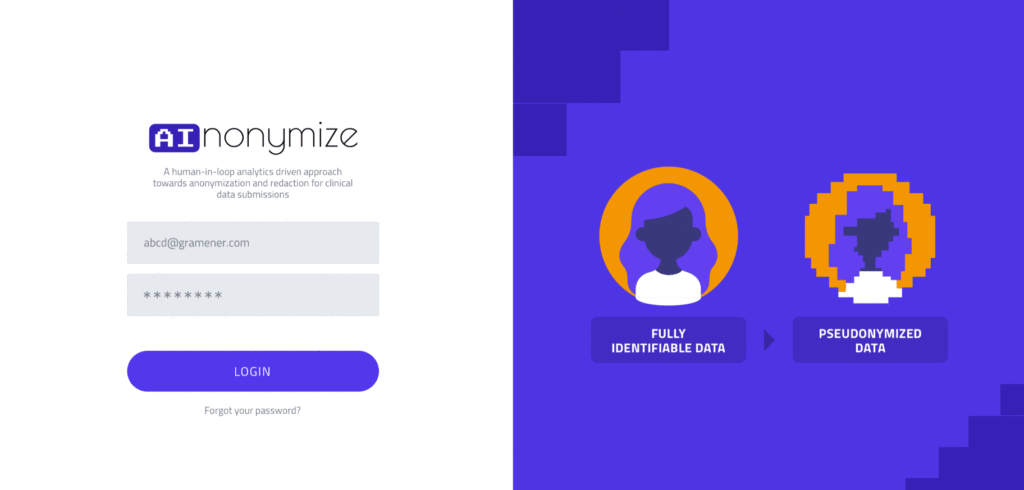Did you know a recent Accenture report reveals GenAI will significantly shift the pharma and healthcare industry by augmenting 40% of all working hours? The study shows a strong consensus among participants, with 98% of providers and 89% of healthcare executives expressing belief in the potential of these advancements to usher in enterprise intelligence. In this blog, we’ll unravel the compelling Generative AI use cases in Pharma, offering a glimpse into a future where intelligence meets ingenuity to reshape the very fabric of medical advancement.
Before reading the blog, please note that some of the use cases we mention here are in practice, and some are still in the exploration stage. Read on.
Table of Contents
Top 10 Generative AI Use Cases In Pharma
GenAI offers incredible scope for Pharmaceutical operations such as commercial, clinical trials, regulatory, and drug discovery. Let’s dive into the top 10 use cases making pharmaceutical companies adopt change faster.
#1 Marketing Promotional Material for Better HCP Outreaches
Generative AI Solutions significantly reduces the promotional material generation time, providing an unparalleled personalized touch.
Leveraging GenAI, pharmaceutical firms can craft personalized marketing initiatives by analyzing patient data. This involves generating customized messages or offers tailored to individual patient profiles and specific needs.

#2 PII Anonymization as Per Regulatory Standards
GenAI can reduce your team’s clinical report anonymization time and ensure patient data privacy. Gramener’s data anonymization product, AInonymize, boosts team productivity by expediting clinical data redaction and swiftly navigating regulatory hurdles.
AInonymize goes beyond time efficiency; it champions compliance, aligning seamlessly with GDPR and EMA 0070. Hence, this solution is crucial for meeting evolving regulatory requirements while ensuring precision in data protection.

AInonymize assigns risk scores to documents, empowering your team to identify and mitigate vulnerabilities and actively contributing to reducing potential data breaches.
As reported by Health IT Analytics, Augmentation PETs (privacy enhancing technologies) leverage historical data distributions to construct genuine datasets, effectively safeguarding patient privacy. These datasets complement existing data sources by augmenting limited datasets or generating entirely synthetic ones. This approach elevates the value and availability of datasets used in analytical pursuits.
#3 LLM-Based Clinical Text Prediction
LLM-based models can extract unstructured clinical notes or text from electronic health records. These models are versatile clinical predictive engines, offering a streamlined development and deployment process.
A recent study harnessed advancements in natural language processing to train a robust medical language model (NYUTron), fine-tuning it for various clinical and operational predictive tasks.
#4 Clinical Research Paper Summarization
GenAI’s advanced algorithms and natural language processing can analyze and distill complex clinical research papers into concise, insightful summaries.
This enhances efficiency in information retrieval and empowers researchers, healthcare professionals, and decision-makers with quick access to key findings and relevant insights.
With GenAI, assimilating and comprehending extensive clinical literature becomes more efficient and effective, paving the way for accelerated medical knowledge and decision-making advancements.
This solution helped one of our clients, an American multinational pharmaceutical company, create impactful presentations, enrich the discourse at conferences, and accelerate the pace of medical advancements.
Read More: Find out the top 10 Gen AI projects we’re doing at Gramener
#5 Image Generation for Pharma Marketing Assets
GenAI combines advanced algorithms and generative capabilities to produce captivating and relevant visuals tailored specifically for HCP audiences. For example, GenAI helps illustrate medical concepts, showcase product features, or create engaging graphics that are easy to understand.
Thus, it enhances the overall aesthetic appeal and effectively communicates complex information, making your promotional materials more engaging and impactful for HCPs in the healthcare industry.
#6 Gen AI Bots for Sales Training
GenAI leverages advanced algorithms and generative processes to tailor sales training materials per custom needs. GenAI creates engaging, effective, personalized training content, from dynamic presentations to interactive modules. GenAI-driven training material generation can equip your sales team to seal more deals.
Explore Solutions: Find out more Gen AI solutions for Commercial Pharma operations
#7 GenAI Use Case for Assisted Diagnosis And Decision Support Systems
One of the top Generative AI use cases in pharma and healthcare is an assisted diagnosis and decision system. Leveraging extensive datasets and advanced algorithms, GenAI-driven systems offer healthcare professionals invaluable insights, facilitating precise diagnoses and treatment strategies.
These systems meticulously analyze patient information, medical literature, and clinical records, delivering evidence-based recommendations. Let’s take the example of Watsonx.ai. IBM has empowered this healthcare supercomputer with generative AI capabilities.
Through watsonx.ai, you can effortlessly train, validate, fine-tune, and deploy generative AI foundational models and machine learning functionalities. Thus, it enables the swift development of AI applications in less time and with reduced data requirements.
IBM’s Watson for Oncology employs AI to support oncologists in crafting tailored treatment strategies. It accomplishes this by sifting through an extensive collection of medical literature, clinical trial data, and patient records.
#8 GenAI Use Case For Drug Discovery And Development
Generative AI has demonstrated significant potential in drug discovery and development. For instance, companies like Insilico Medicine, which has introduced a generative AI platform known as GENTRL, have made notable strides in this area.
This advancement promises to reduce reliance on outdated methods such as manual patient diary entries, faxing medical records, and mailing findings to regulatory agencies.
The emergence of generative AI stands poised to bring about a revolution in these traditional practices. It enables the rapid and efficient analysis of extensive datasets, facilitating the swift identification of promising candidates for clinical trials, optimization of molecular structures, and even predicting potential side effects and interactions. This unparalleled level of data processing accelerates the drug discovery process and elevates the precision and safety of drug development.
#9 GenAI Use Case For Predicting Risks Of Severe Health Crises
Generative AI models are becoming indispensable in predicting catastrophic health events. They offer valuable insights for scientists studying pandemics and preventive measures and can also analyze vast datasets, help identify new antibodies to combat infectious diseases and understand their etiology.
Additionally, GenAI aids in constructing data-driven outbreak responses, leveraging transmission dynamics and epidemiological trends. These advancements are revolutionizing our approach to health crises, equipping us with powerful AI tools for risk prediction and mitigation and ultimately enhancing global healthcare preparedness.
GenAI models have emerged as a vital resource for modeling new pandemics and developing preventive measures. Some new generative AI models are currently being trained on large amounts of protein sequences to identify new antibodies that could address infectious diseases and construct outbreak responses for the future.
Benefits Of GenAI in Healthcare And Pharma
Reduce Time
GenAI can save significant time in discovering drugs. It can predict novel drug candidates faster. The generative AI model can also improve the molecular structure and analyze large datasets accurately.
Reduce Costs
Generative AI can automate some phases of drug development and reduce costs. In addition, such automation can reduce human errors. However, cost saving depends on the cost of AI implementation with efficiency gains. It may differ from company to company. According to McKinsey, GenAI can save up to 8% to 15% in drug development.
Enhance Collaboration
GenAI can enhance interdisciplinary collaboration in complicated problem-solving scenarios. As per Nature Biotechnology, large language models (LLM) and generative AI maximize the productivity of engineers and data scientists. AI technology can also match data from various sources and build collaborative data networks.
Drug Design
Pharmaceutical companies can utilize GenAI to design new drugs by building optimized molecular structures for potency, selectivity, and bioavailability.
Clinical Trials
You can optimize clinical trials with generative AI. This technology can identify genetic markers that predict a patient’s response to a specific drug.
Personalized Medicine
Personalized medicine is a developing field that creates tailored treatments for individual patients depending on their genetic makeup and other characteristics. Generative AI can help enhance treatment outcomes and decrease side effects by creating molecules custom to individual patient characteristics.
Lead Optimization
This process involves modifying the structure of the drug molecule to enhance its pharmaceutical properties, including safety, efficacy, and pharmacokinetics. Generative AI can boost this process by making new molecules identical to the lead component but with superior properties. Scientists can synthesize and test these new molecules for efficacy and safety.
Drug Repurposing
It is about finding new uses for existing drugs. Generative AI can support this process by creating new molecules identical to the existing drug but with separate properties. Scientists can test these new molecules for their healing potential for other diseases.
Conclusion
With 20+ GenAI projects, Gramener is a pioneer in implementing Generative AI to address various clinical operations and commercial pharma challenges – including PII anonymization, promotional content generation, creative image generation, and Gen AI-driven pharma sales training. Our tailored Generative AI solutions are designed for improved HCP engagements.

